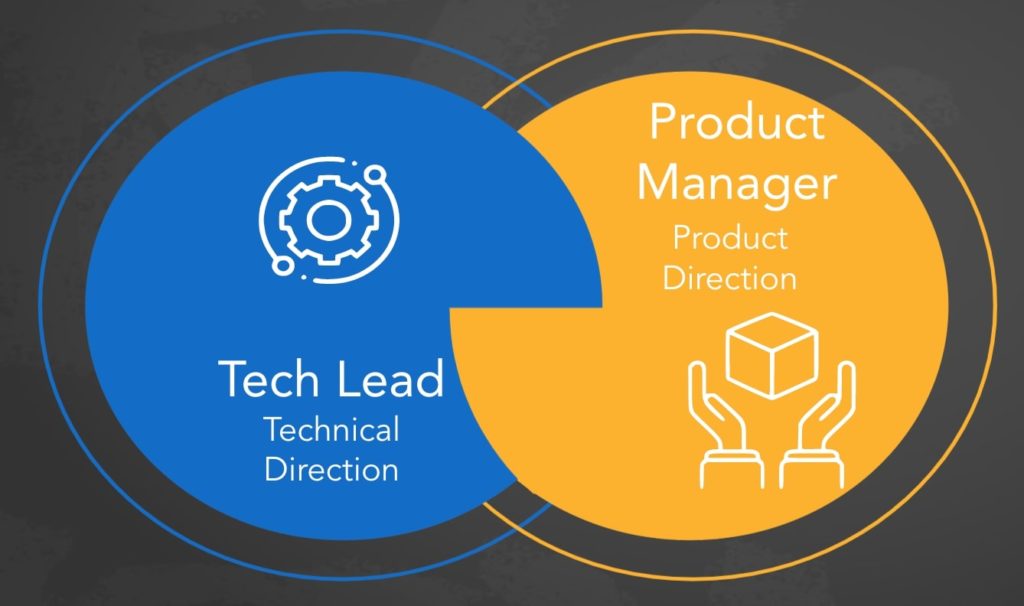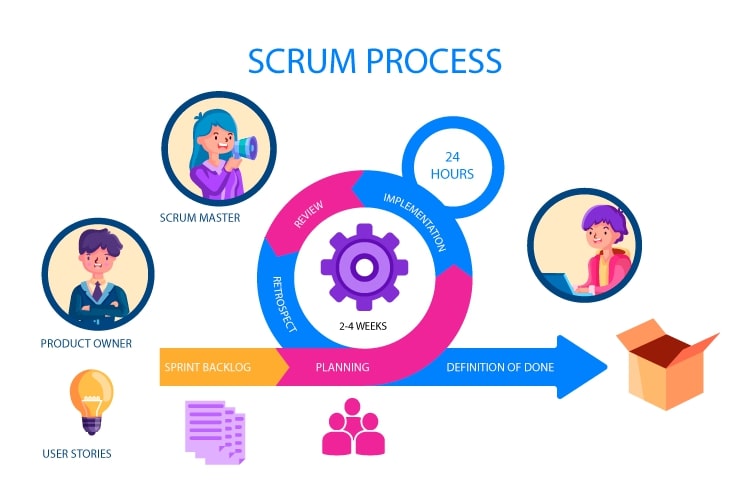Want to find out the truth about the technical product manager vs Scrum manager debate?
When software development or other teams design and create new products, they do so under the supervision of multiple managers.
For that reason, It’s common for aspiring product professionals to confuse technical product managers and scrum managers. While there are points of similarity between both positions, there are core differences that separate and define each one’s roles and responsibilities within an organization.
Let’s explore the role of technical product manager vs scrum manager and break down their major differences. To learn more via video, watch below. Otherwise, skip ahead.
Technical Product Manager Role
Product managers are dynamic and have many responsibilities. These professionals oversee the creation and development of a tech product. Furthermore, technical product managers organize deliverables across teams.

They don’t just work within their own team. Even when overseeing a scrum agile team, they collaborate with teams using other methodologies.
When a team designs, develops, and launches a product, they follow this sequence:
- A product owner creates the initial idea for the product. They “own” the product, its results, and its impact on a wider organization
- A product manager then defines the product’s details. They oversee the creation, development, and launch of the product
- Scrum managers handle the day-to-day achievement of those goals by overseeing scrum compliance
In a broader sense, product managers examine overall business strategies and objectives. They then make sure that the team builds what’s necessary to ensure that they meet product guidelines and goals.
Because of this focus, technical product managers have specific skills to do their jobs. They must have:
- Strong organizational skills
- Good interpersonal communication skills
- In-depth understanding of company products and development cycles
- In-depth understanding of scrum processes and procedures
- Excellent time management
- Leadership skills
Tech product managers lead product design and creation in ways that scrum managers do not.
Scrum Manager Role
Scrum managers focus on implementing and enforcing the agile scrum development methodology for a company or product development team. The Scrum methodology is an agile software development framework that:
- Enables teams to prioritize goals in a product backlog
- Helps teams adapt to changing conditions, user requirements, or shifted objectives
- Completes objectives for a given day, week, or month
- Allows team members to streamline their efforts towards specific objectives within timeframes called “sprints”

Credits: Digite.com
This framework enables product owners, scrum teams, and project managers to work together and accomplish objectives on time. Scrum masters play key parts in this process. The scrum master owns the process and works towards a smooth and productive team.
A scrum master helps ensure that team members follow the scrum methodology guidelines. They do not focus on what the team builds or what objectives are ahead. Instead, scrum managers are responsible for reducing the likelihood of employees deviating from approved procedures or policies that slow down the scrum process.
Scrum managers also have specific skills that help them to complete their duties. Scrum master role skills include:
- Scrum knowledge & framework skills scrum processes, procedures, and benefits
- Scrum training skills
- Communication skills
- Time management skills
Technical Product Manager vs Scrum Manager: Differing Responsibilities
Let’s take a look at the major differences in responsibilities for scrum masters vs product managers.
Technical Product Manager Responsibilities to the Development Team
Technical product managers have primary responsibilities to the overall development team and employing organization. They report to executives or superiors, then pass orders or goals down to lower team members.
Technical product managers have many different responsibilities within a development pipeline. Product manager responsibilities include:
- Providing expertise throughout the product development process
- Being responsible for overall product experience success
- Communicating between team members, stakeholders, and company executives
Scrum Master’s Responsibilities to the Scrum Team
Scrum managers don’t have as wide-ranging responsibilities as product managers. In many ways, they do not concern themselves with the overall outcome of a product and how customers receive product experiences.
Instead, scrum managers make sure that their agile product development team uses the scrum framework according to guidelines.
The responsibilities of scrum masters include:
- Ensuring that all team members understand the right agile scrum methodology concepts
- Helping people outside the team understand the scrum process and how it relates to the product vision
- Facilitating successful interactions within and between team members
- Being well-versed in all scrum practices, values, and potential applications in an agile environment
- Offering in-depth knowledge and expertise for scrum practices and procedures
- Training new team members on how to engage with the scrum methodology
Technical Product Manager Salary
Because technical product managers oversee most aspects of product development, they earn significant compensation for their efforts. On average, technical product managers earn $124,000 per year. However, the highest-paid tech product managers earn up to $360,000 per year. The lowest-paid earn around $46,000 per year.
Scrum Manager Salary
Scrum managers, also called agile project managers, earn average salaries of $139,500. Total compensation often ranges between $124,000 and $156,000. Scrum managers have lower potential salary totals due to their more limited responsibilities.
Technical Product Manager Career Path
Most technical product managers proceed through straightforward career paths.
After 3 to 5 years of working as a product manager or project manager, these professionals become senior product managers. They gain additional responsibilities and oversee several subsidiary product managers and also oversee the development of multiple products made at the same time.
Senior product managers become product leaders or principal product managers. These professionals oversee even larger groups and communicate with higher-level executives across multiple departments (including marketing, customer service, and more)
Beyond this point, former technical product managers choose to become company executives, thought leaders, and more. These professionals have a lot of potential career pathways to consider.
Scrum Manager Career Path
Scrum master careers have the potential to evolve along different paths. One of the most common positions is that of a Scrum mentor. Scrum mentors teach other scrum masters or managers. They have job titles like “agile coach”. This path is ideal for scrum managers who find the product development process enjoyable regardless of what the product is.
However, scrum managers always have the option to pivot away from a scrum focus. Other careers include:
- Product owner. Some scrum managers take the alternative path and focus more on what they build instead of how. They take on responsibilities closer to those of project managers when they become product owners
- Product manager. Some scrum masters take the other job described in this guide if they prefer a broader leadership role. Product management is similar to the scrum master role in many ways
- Chief information officer. Scrum masters who develop their skills and who prefer exploring other methodologies or development practices become CIOs for companies
Technical Product Manager vs Scrum Manager: Key Takeaways
Both technical product managers and scrum managers play important roles in product design, development, and creation. Technical product managers oversee the “how”, “why” and “what” when creating and launching a new product. They also ensure that products launch on time and to customers’ satisfaction.
Scrum managers focus on ensuring that team members follow approved scrum practices and broader methodological principles. They coordinate with team members, teach new team members how to follow scrum practices, and facilitate a smoother product development experience without focusing on what is being made.
Both professionals are vital for product success, and both enjoy stable and lucrative career paths as they develop their skills.
